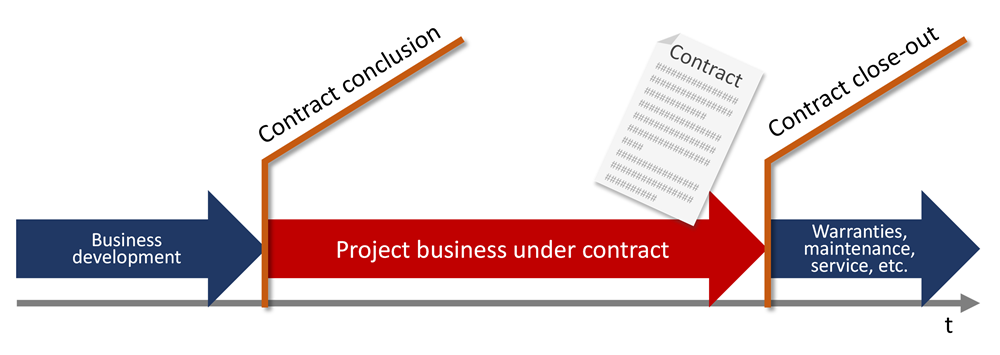Project Business Management
SERIES ARTICLE
By Oliver F. Lehmann
Munich, Germany
“For what one has, in black and white,
One carries home and then goes through it.”
―Goethe, Faust 1[1]
Summary
In project business management, it is essential for project managers to know the contract. In addition to that, they should have education to understand commercial and legal factors of project business to the depth necessary to perform the projects successfully and to the satisfaction of stakeholders.
Project Managers and Legal Knowledge
A project manager is not expected to be a lawyer. The percentage of lawyers managing projects seems to be quite small, most project managers have a different education and are trained in technical and organizational matter, not in legal details. In project business however, a deficiency in legal knowledge can be a problem. Project managers have to make a multitude of decisions every day, each of which can have legal implications, and many of them can cause problems in a worst-case scenario, when a lawsuit is threatened or actually filed.
One can compare this with driving a car: A driver has to make many micro-decisions on the way from one place to another, and each of these decisions may be wrong. Before people can drive cars, they have to be taught by a driving instructor, and the instructions do not only take account of technical matters, but also include knowledge of and compliance with a body of traffic law. Illiteracy or disregard of traffic law can lead to dangers for life, health, and bank accounts. The driving instructor is not a legal expert but needs to know the rules well enough to be able to pass them on.
In project business management, the same applies, however the number of instructors is small. People therefore often learn the rules by trial and error. Unfortunately, trial in projects under contract is expensive, and error often even more.
In project business management, the project contract is an expression of the hopes and wills of the two (or more) parties at the moment of conclusion, but also of their uncertainties, concerns, and fears in this moment. Understanding its relevance is essential for success of any cross—corporate project.
It is therefore surprising, that project managers often don’t know the contract, and this is true for both sides, customers and contractors. Time to dig deeper into the matter. Project contracts matter in project business.

Figure 1: The project contract ends the business development phase and begins the delivery phase.
Why Contracts Matter in Project Business
The core document of project business is the project contract.
Project contracts are different from other contracts. It is important for success in project business that project managers understand these differences and act appropriately. And that they know the contract.
More…
To read entire article, click here
Editor’s note: This series of articles is by Oliver Lehmann, author of the book “Project Business Management” (ISBN 9781138197503), published by Auerbach / Taylor & Francis in 2018. See author profile below.
How to cite this article: Lehmann, O. (2020). The Great Challenge: Project Contracting; Series on Project Business Management; PM World Journal, Vol. IX, Issue VI, June. Available online at https://pmworldlibrary.net/wp-content/uploads/2020/06/pmwj94-Jun2020-Lehmann-Project-Contracting-PBM-series-article2.pdf
About the Author

Oliver F. Lehmann
Munich, Germany
![]()
Oliver F. Lehmann, MSc, ACE, PMP, is a project management educator, author, consultant, and speaker. In addition, he is the President of the Project Business Foundation, the home association for professionals and organizations involved in cross-corporate projects.
He studied Linguistics, Literature and History at the University of Stuttgart and Project Management at the University of Liverpool, UK, where he holds a Master of Science Degree. Oliver has trained thousands of project managers in Europe, USA and Asia in methodological project management with a focus on certification preparation. In addition, he is a visiting lecturer at the Technical University of Munich.
He has been a member and volunteer at PMI, the Project Management Institute, since 1998, and served as the President of the PMI Southern Germany Chapter from 2013 to 2018. Between 2004 and 2006, he contributed to PMI’s PM Network magazine, for which he provided a monthly editorial on page 1 called “Launch”, analyzing troubled projects around the world.
Oliver believes in three driving forces for personal improvement in project management: formal learning, experience and observations. He resides in Munich, Bavaria, Germany and can be contacted at oliver@oliverlehmann.com.
Oliver Lehmann is the author of the books:
- “Situational Project Management: The Dynamics of Success and Failure” (ISBN 9781498722612), published by Auerbach / Taylor & Francis in 2016
- “Project Business Management” (ISBN 9781138197503), published by Auerbach / Taylor & Francis in 2018.
His previous articles and papers for PM World Journal can be found here:
[1] (Goethe, 2005)










